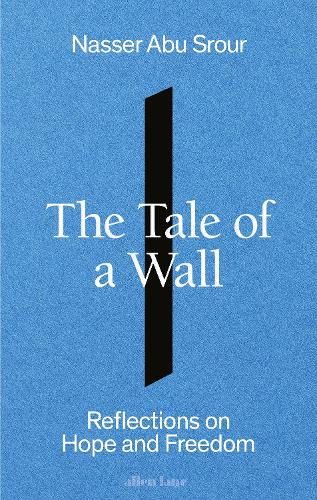
The Tale of a Wall: Reflections on Hope and Freedom
(Paperback)
Available Formats
Paperback
Published: 29th July 2025
Paperback
Published: 30th July 2024
Paperback
Published: 30th April 2024
Publishing Details
The Tale of a Wall: Reflections on Hope and Freedom
By (Author) Nasser Abu Srour
Translated by Luke Leafgren
Penguin Books Ltd
Allen Lane
30th July 2024
30th April 2024
United Kingdom
Classifications
General
Non Fiction
True stories of survival of abuse and injustice
Middle Eastern history
Political oppression and persecution
956.9405092
Physical Properties
Paperback
320
Width 135mm, Height 216mm, Spine 24mm
334g
Description
A Palestinian prisoner's memoir of thirty years' captivity, and a love letter to the wall that encircles and comforts him This is the story of a wall that somehow chose me as the witness of what it said and did Nasser Abu Srour grew up in a refugee camp in the West Bank, on the outskirts of Bethlehem. As a child, he played in its shadow and explored the little world within the camp. As he grew older, he began questioning the boundaries that limited his existence. Later, sentenced to life in prison, with no hope of parole, he found himself surrounded by a physical wall. This is the story of how, over thirty years in captivity, he crafted a new definition of freedom. Turning to writings by philosophers as varied as Derrida, Kirkegaard and Freud, he begins to let go of freedom as a question that demanded an answer, in order to preserve it as a dream. The wall becomes his stable point of reference, his anchor, both physically and psychologically. As each year brings with it new waves of releases of prisoners, he dares to hope, and seeks refuge in the wall when these hopes are dashed. And, in a small miracle, he finds love with a lawyer from the outside - while in her absence, the wall is his solace and his curse. A testimony of how the most difficult of circumstances can build a person up instead of tearing them down, The Tale of a Wall is an extraordinary record of the vast confinement and power of the mind.
Reviews
The Tale of a Wall is the reason we have literature. Nasser has made art out of poison with his honesty and golden pen. He brings to light the specificity of experience of the Palestinian prisoner in a manner that makes every reader think about the incarcerated in their own countries without forgetting Palestine. It helps us understand the consequences on others when we do not wield whatever power we each hold for solidarity. A profound and important work -- Sarah Schulman
A stunning book. A poetic and remarkable account of decades of imprisonment and the effect it can have on the mind, body and soul. This is a story of unimaginable loss, but also of survival -- Sally Hayden
Nasser Abu Srour doesnt allow his long incarceration in an Israeli prison to break his spirit. He turns to the wall of his cell that is intended to confine him into his path to freedom, and in the process, out of the darkness of his cell produces a luminous memoir -- Raja Shehadeh, author of We Could Have Been Friends, My Father and I: A Palestinian Memoir
In contemplating the meaning of freedom, and the prison walls enclosing him, Nasser Abu Srour has produced a richly emotional and affecting memoir. His poetic prose, lyrically translated by Luke Leafgren, ranges far beyond physical confines to evoke steadfastness and universal human dignity, through the intellectual curiosity of a writer born into a family on the margins, living in a marginal place filled with marginal people. Its resonance, and Abu Srours vision, are far from marginal -- Matthew Teller, author of Nine Quarters of Jerusalem
An extraordinary memoir. Abu Srour is not just a witness of his personal life but a witness to one of the major tragedies of our times -- Amara Lakhous, author of Clash of Civilizations Over an Elevator in Piazza Vittorio
A unique, lyrical exploration of what his inhumane confinement has taught him about resistance, love, lies, forgiveness, and the complicated struggle for liberation of his fractured, occupied land. Rather than allow the many walls surrounding him from childhood to break him down, he has turned them into darkly luminous companions on a journey into the heart of cruelty and redemption -- Ariel Dorfman, author of The Suicide Museum
Author Bio
Nasser Abu Srour was arrested in 1993 and sentenced to life in prison. While incarcerated, Abu Srour completed the final semester of a bachelor's degree in English from Bethlehem University, and obtained a master's degree in political science from Al-Quds University. The Tale of a Wall is his first book to appear in English. Luke Leafgren is an Assistant Dean of Harvard College. He has translated seven novels from Arabic, including Muhsin Al-Ramli's The President's Gardens, for which he received the 2018 Saif Ghobash Banipal Prize for Arabic Literary Translation.
